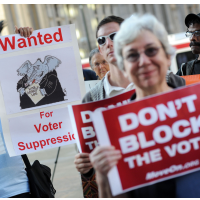Supreme Court Ruling on Housing Discrimination could Lead to Challenges to Republican Voter Suppression Laws
 (photo: Getty Images)
(photo: Getty Images)
Thursday’s Supreme Court ruling on housing discrimination could have a wider impact, affecting even laws on voting procedures that many say are intended to suppress voter turnout.
In the housing ruling (Texas Department of Housing and Community Affairs et al. v. Inclusive Communities Project), the court narrowly decided that victims of housing discrimination need not prove that government policies intended to hurt them, just that said policies had a disparate impact, that is, that they had a discriminatory effect even if that law wasn’t intended to do so.
The case arose from a complaint that the Texas Department of Housing and Community Affairs had exacerbated segregation in Dallas by approving subsidized low-income housing only in poor neighborhoods filled with minorities.
From this ruling, however, opponents of new voting laws pushed by Republicans say the rationale in the Texas case could apply to challenging voter ID laws and similar legislation. The laws’ effect is to curb voting by minorities, older people and students; those most likely to vote Democratic. Some Republicans have even admitted that that is the purpose of the new legislation.
Senior Attorney Kathy Culliton-Gonzalez with the Advancement Project told ThinkProgress that the ruling is “very helpful” with current lawsuits against voting laws.
“These days it’s very, very hard to prove intent,” she said. “We have a lot of implicit bias and symbols of racism, like the Confederate flag, but we don’t always find state legislators saying, ‘We’re going to suppress the African American vote or the Latino vote.’ But there are things that are quite discriminatory in voting that occur on a regular basis.”
Culliton-Gonzalez added: “It prohibits any practice or procedure that has the effect of diminishing the ability of voters of color to elect their candidates of choice, like voter ID laws, requiring proof of citizenship, cuts to early voting, and modern-day poll taxes and literacy tests. Now we’re seeing cases litigating new types of voter suppression that haven’t been tried in the past, and people are questioning whether ‘disparate impact’ is enough. It’s still very difficult to prove, but it’s been shored up by today’s opinion.”
The decision could make it a bit easier to prove disparate impact, but it can’t be based only on statistical disparities, according to Amy Howe at SCOTUSblog. Plaintiffs would have to show that an action actually caused a disparity.
-Noel Brinkerhoff
To Learn More:
How The Supreme Court’s Major Housing Ruling Could Impact Voter ID (by Alice Ollstein, ThinkProgress)
Disparate-Impact Claims Survive Challenge: In Plain English (by Amy Howe, SCOTUSblog)
Texas Department of Housing and Community Affairs et al. v. Inclusive Communities Project (U.S. Supreme Court)
Report Shows Voter ID Laws Cut Participation in 2012 Election in Kansas and Tennessee (by Noel Brinkerhoff, AllGov)
Minority Youth More Likely to be Asked for ID When Voting than Whites (by Noel Brinkerhoff, AllGov)
Former Republican Officials Admit to Voter Suppression Efforts and “Marketing Ploy” to Damage Democrats (by Noel Brinkerhoff, AllGov)
- Top Stories
- Unusual News
- Where is the Money Going?
- Controversies
- U.S. and the World
- Appointments and Resignations
- Latest News
- Trump to Stop Deportations If…
- Trump Denounces World Series
- What If China Invaded the United States?
- Donald Trump Has a Mental Health Problem and It Has a Name
- Trump Goes on Renaming Frenzy






Comments